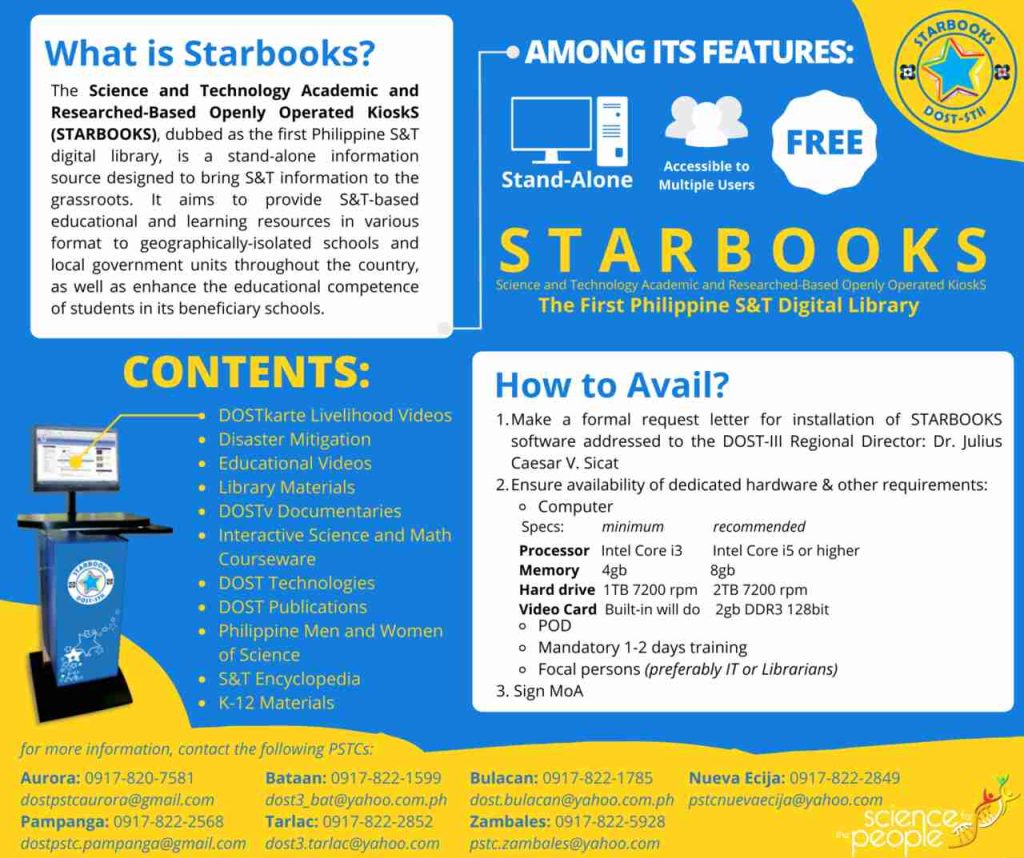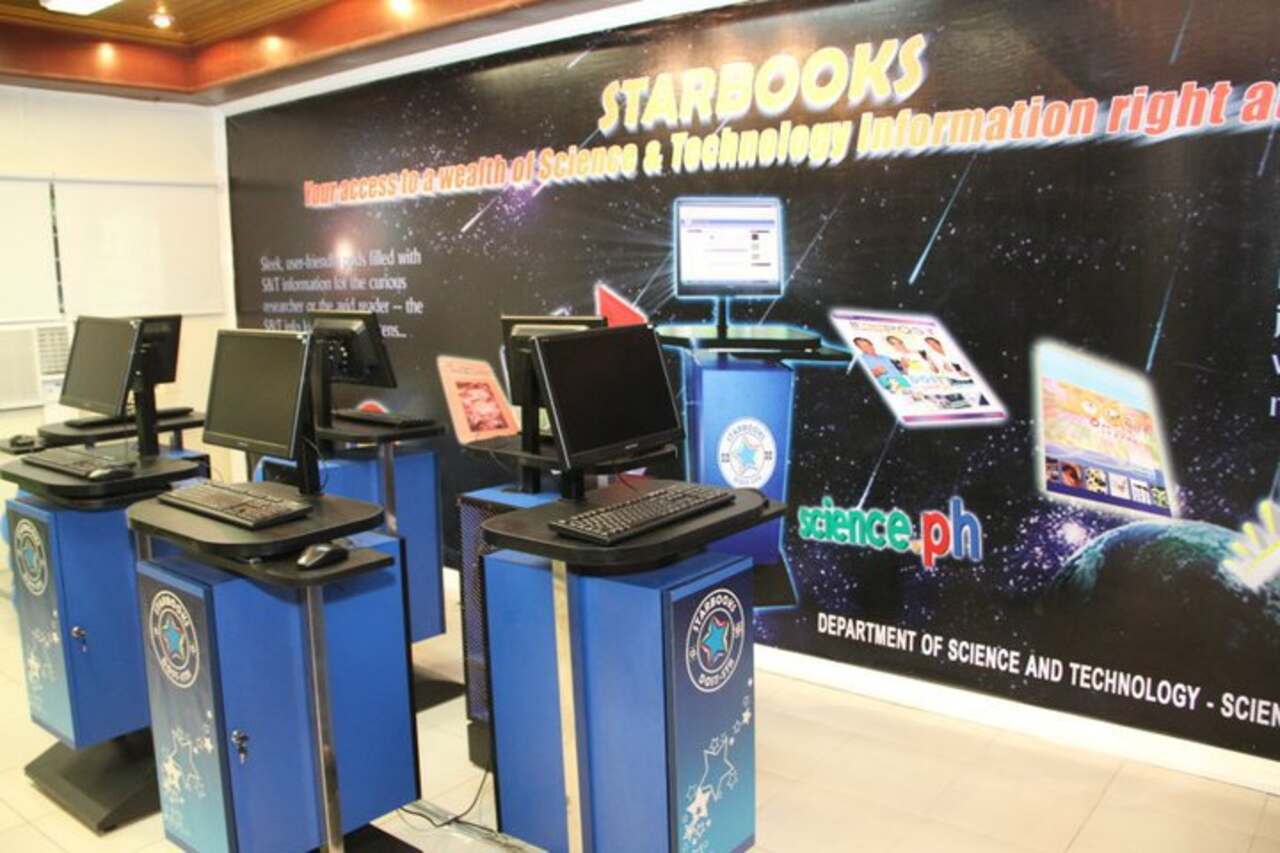The Science and Technology Academic and Research-Based Openly-Operated Kiosks (STARBOOKS) is a digital library designed to provide access to science, technology, and innovation (STI) resources, especially in remote and underserved areas in the Philippines. Developed by the Department of Science and Technology (DOST) and launched in 2011, STARBOOKS offers a wealth of digitized educational materials in various formats, including text, audio, and video. It serves as a standalone kiosk, enabling users to access information even without an internet connection, and serving as a bridge to close the information gap in geographically isolated and economically challenged communities.
This DOST initiative was designed to provide educational institutions, local governments, and organizations with access to vast S&T resources in an effort to democratize access to science, technology, and innovation (STI) information, especially in remote and underserved communities. By following the outlined steps listed in this guide, stakeholders can successfully set up their own STARBOOKS kiosk, bringing quality science and technology information to their organization and communities.
Objectives of DOST STARBOOKS

In many parts of the Philippines, access to up-to-date STI resources is limited due to geographical and economic constraints. Traditional libraries may lack the necessary materials, and internet connectivity can be unreliable or nonexistent. Recognizing these challenges, DOST developed STARBOOKS to bridge the information gap and foster a culture of scientific inquiry and entrepreneurship.
The primary objectives of STARBOOKS are:
- Promote Interest in Science and Technology: By providing accessible STI resources, STARBOOKS encourages students and the general public to pursue education and careers in science and technology.
- Encourage Innovation and Invention: The platform serves as a repository of knowledge, inspiring users to develop new ideas, inventions, and innovations.
- Support Entrepreneurship and Socio-Economic Development: With resources like the “Tamang DOSTkarte Livelihood Videos,” STARBOOKS aims to enhance entrepreneurial skills, contributing to community development and economic growth.
Key Features of STARBOOKS
It was designed with user-friendly features to ensure broad accessibility and usability. Some of these key features include:
- Standalone Information Kiosk: Operates without the need for internet connectivity, making it ideal for areas with limited or no internet access.
- Extensive Digital Content: Hosts thousands of digitized resources, including research papers, journal articles, educational videos, and K-12 learning modules covering various STEM fields.
- Multi-Access Capability: When connected to a local area network (LAN) or local Wi-Fi, multiple users can simultaneously access the resources, facilitating collaborative learning environments.
- User-Friendly Interface: Features an intuitive design with advanced search capabilities, allowing users to easily navigate and retrieve information.
- Transportable Design: The kiosk is easily transportable, enabling deployment in various locations, including schools, libraries, and community centers.
- Offline Accessibility: Ensures that users can access a wealth of information without relying on internet connectivity, crucial for remote areas.
- Regular Content Updates: While the system operates offline, DOST provides periodic updates to ensure the information remains current and relevant.
- Supplementary Mobile Applications: To adapt to evolving educational needs, STARBOOKS offers mobile apps such as the STARBOOKS Mobile App for Android devices, the STARBOOKS Whiz App—a gamified quiz application—and the STARBOOKS Finder App, which locates STARBOOKS sites nationwide.
Through these, STARBOOKS has become an important tool in enhancing STI education and resource accessibility across the Philippines, particularly benefiting communities with limited access to traditional libraries and internet resources.
Benefits
Some benefits that come with availing this DOST program include:
- Access to Extensive S&T Information: Users gain access to thousands of digitized science and technology materials.
- No Internet Required: STARBOOKS operates as a standalone digital library, making it ideal for areas with limited connectivity.
- Encourages Learning and Innovation: Designed to support students, researchers, and entrepreneurs with valuable knowledge.
- Entrepreneurial Learning: Features “Tamang DOSTkarte Livelihood Videos” to support small business ventures.
- Continuous Support and Monitoring: DOST provides ongoing technical support and system updates.
Who Can Avail of STARBOOKS?
The STARBOOKS program is available to a range of institutions, including:
- Local Government Units (LGUs)
- Non-Governmental Organizations (NGOs)
- Educational Institutions
- Private Corporations
- Enterprise and Industry Associations fully owned by Filipino citizens
- Any government entity, including Local Government Units (LGUs) and civil society organizations
Eligibility Criteria
The STARBOOKS program, while open to various institutions across the Philippines, still require that the applicants meet the following criteria:
- Educational Institutions: Schools, colleges, and universities seeking to enhance their library resources.
- Local Government Units (LGUs): Municipalities aiming to provide their constituents with access to scientific and technological information.
- Non-Government Organizations (NGOs): Organizations focused on community development and education.
- Private Corporations: Companies interested in promoting STEM education and research.
Requirements for Availing STARBOOKS
To set up a STARBOOKS kiosk, interested organizations must fulfill the following requirements:
- Request Letter: A formal letter addressed to the Provincial Science and Technology Office (PSTO) or DOST Regional Office.
- Partner Institutional Profile: A filled-out form provided by the PSTO.
- Computer Unit: The requesting party must provide hardware that meets DOST’s specifications.
- Memorandum of Agreement (MOA): Signed document formalizing the partnership.
- Space Requirement: A designated space measuring at least 3m x 4m for the kiosk setup.
- Training: The requesting organization must participate in a 1–2 day training session for proper utilization and maintenance of STARBOOKS.
Procedures
To avail of STARBOOKS, you can simply follow these steps:
Step 1: Submit a Request Letter
- The requesting institution must send a formal request letter to the PSTO or DOST Regional Office.
- The request is recorded, processed, and endorsed to the relevant office within 15 minutes.
Step 2: Fulfill Pre-Installation Requirements
- The requesting party must complete all necessary documents and ensure that the required hardware is in place.
- The PSTO coordinates with the institution to verify readiness.
Step 3: Institutional Visit and Code Request
- The PSTO STARBOOKS focal person, along with other staff, visits the site for assessment and validation.
- The DOST Science and Technology Information Institute (DOST-STII) issues an institutional code.
Step 4: Scheduling Installation and Training
- The PSTO coordinates with the requesting party to schedule STARBOOKS installation.
- The organization signs the MOA.
- STARBOOKS is installed on-site or at the PSTO, followed by an administrator and user training session.
- DOST continuously monitors the system’s performance and usage.
Technical Specifications of STARBOOKS Hardware
STARBOOKS requires a specific set of computer hardware for proper functionality. Institutions have two options:
Option 1: All-in-One PC Setup
- Processor: Intel Pentium E6700 (up to 3.2GHz)
- Memory: 2GB DDR3
- Hard Drive: 1TB
- Display: Integrated Intel Graphics Media Accelerator X4500
- Total Estimated Cost: PHP 40,966.75
Option 2: Standard PC Setup
- Processor: Intel H57 Express chipset
- Memory: 2GB DDR3
- Hard Drive: 500GB
- Display: Intel Graphics Media Accelerator HD
- Total Estimated Cost: PHP 35,966.75
Additional Costs:
- STARBOOKS Pod: PHP 9,998.75
- STARBOOKS Sticker: PHP 968.00
- Shipping and installation expenses borne by the requesting institution.
Expenses and Funding
The requesting institution is responsible for covering:
- Site Inspection Costs: Transportation, accommodation, and meal expenses for the DOST team.
- Equipment Costs: Organizations may purchase their own computer units, provided they meet DOST specifications.
- MOA Signing Costs: If a formal MOA signing ceremony is required, the institution must cover related expenses.
Video: DOST STARBOOKS Online Walkthrough
To better understand what it is and how it helps communities and organizations alike, watch thus video from DOST STARBOOKS:
